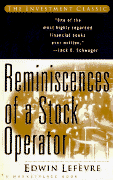 All Entries in the "Trading Psychology" Category
All Entries in the "Trading Psychology" Category
My Biggest Trading Fear
January 18, 2006 at 4:24 pm
My trading strategy is not one that will have me so exposed to any particular trade that if something bad happened I would be wiped out. Because of this, my fear isn’t that I will someday have to take a giant loss on a bad trade. Yes, I will be wrong and take my medicine, but that’s not a big concern to me.
The losing streak is the big bad ugly monster I don’t want to fall victim to. I’ve known a number of traders who allowed losing streaks to continue, and it’s scary. A losing streak leaves a trader not knowing which way is up. During a losing streak, you don’t know what to trade, when to trade, or which way to trade. You don’t know which indicators are meaningful and which are useless. Choppiness looks like a tradable pattern and what ultimately gets chopped up is your account. You’ll change your approach daily, never giving any strategy a fair evaluation. You may even start trading opposite of what you think, just to put an end to it. In short, you become clueless, and are never the same.

This is of course my 2nd biggest fear
No thank you!
Every trader needs capital to trade. Cash in an account is one type of capital, but psychological capital is certainly another equal requirement. A trader must have the courage to act on his convictions and put that cash into play. Losing streaks cost money, no doubt, but more importantly they cost a trader confidence. Money can be borrowed, but without confidence, a trader simply becomes a cash holder with no ability to seize opportunity.
Protect your confidence at all times, with as much vigilance as you protect your trading account. When you start losing money, take every measure to stop it. Cut down your trading size, trade less often, and wait for more clarity. Put on the brakes to stop a losing streak, and you’ll avoid the nasty long-term damage it can cause to your trading career.
Jeff White
President, The Stock Bandit, Inc.
www.TheStockBandit.com
Intuition or Into Wishing?
January 17, 2006 at 8:47 am
 The Market Wizards books by Jack Schwager are must-read books for traders of all kinds. These books are loaded with interviews with top traders, and it’s interesting to learn how the featured traders made it to the top of their profession.
The Market Wizards books by Jack Schwager are must-read books for traders of all kinds. These books are loaded with interviews with top traders, and it’s interesting to learn how the featured traders made it to the top of their profession.
One of the featured traders is Ed Seykota, who reportedly was up 250,000 percent between 1972 and 1988 – very much a wizard! Ed’s interview is filled with great insights as to what drives traders, and his play on words in many cases proves to be accurate. One quote that Ed makes is:
“Be sensitive to the subtle differences between ‘intuition’ and ‘into wishing.’”
What great advice! As traders, we all fight the internal battle between what our “gut” is telling us and what we want to happen based on the positions we are holding at any given time. An experienced trader should allow intuition to play a part in the decision-making process when trading, but it certainly is a fine line between what our gut tells us and what our opinions leave us hoping for!
Keep Ed’s quote on your mind and always be aware of what it is that’s driving your next trading decision. Remember, HOPE is not a trading strategy!
Jeff White
President, The Stock Bandit, Inc.
www.TheStockBandit.com
Silence is Golden
January 11, 2006 at 8:32 am
 I used to commute to a day trading office until about 2 years ago. It was good for a while but my needs changed. While I did enjoy interacting with other traders on a daily basis, it was harder at times to concentrate on the market with the sounds of a busy office. The occasional sounds coming from upset traders banging on their desks or yelling was plenty annoying. Others seemed to do more visiting than they seemed to trade. Making the move to a home office saved me some time and gas money, but it really made me a better trader.
I used to commute to a day trading office until about 2 years ago. It was good for a while but my needs changed. While I did enjoy interacting with other traders on a daily basis, it was harder at times to concentrate on the market with the sounds of a busy office. The occasional sounds coming from upset traders banging on their desks or yelling was plenty annoying. Others seemed to do more visiting than they seemed to trade. Making the move to a home office saved me some time and gas money, but it really made me a better trader.
Learning to rely on yourself as a trader is an important and ongoing lesson. While I would encourage a beginning trader to surround himself with more experienced traders, there are a number of advantages to flying solo once the learning curve passes.
I turn on CNBC some mornings just to catch up on some headlines while I am getting set up for the trading day, but once the bell rings, I rarely leave the TV on. I find the endless opinions (valuation schmaluation) to be distracting and not useful for my style of trading. Plus, their idea of “breaking news” is often too late. Instant messenger is another line of communication I typically cut off for the trading day. In the past, I’ve spent trading days chatting with other traders, but in the end I’ve found it more distracting than helpful. At times a good call was made that I might have missed, but having one more window to focus on seemed detrimental to my tape reading and trading results. Now my typical day is extremely quiet with nothing but a snoring dog and an occasional phone call which can easily be dismissed. Much better!
Cut the noise and simplify your approach with just a few nightly swing trading stock picks. Sign up for your 2-week free trial and find out which stocks I’m focusing on today!
Jeff White
President, The Stock Bandit, Inc.
www.TheStockBandit.com
Small Mistakes = Small Consequences
January 9, 2006 at 7:49 am
One of my favorite trading books is Reminiscences of a Stock Operator by Edwin Lefevre. Based on the trading of the famous Jesse Livermore, Reminiscences is full of trading lessons from cover to cover. Although it was written 83 years ago, it still applies to today’s market. Learning from the successes and failures of one of the all-time great traders is hard to beat.
Among the many lessons embedded in the book, one common theme is that a trader should keep his mistakes small. Livermore developed a “probing” system in which he would enter small positions to monitor their activity before he built up to a full position. This way, if he was wrong, it only cost him a little.
Chapter 10 begins with some great advice:
“All stock market mistakes wound you in two tender spots – your pocketbook and your vanity.“
This is so true! No trader wants to take a loss. It costs money and diminishes pride to know you were wrong. The mistake of losing money is compounded into a shot to your confidence which is so important to keep intact as a trader.
Lefevre goes on to say:
“Losing money is the least of my troubles. A loss never bothers me after I take it. I forget it overnight. But being wrong – not taking the loss – that is what does the damage to the pocketbook and to the soul.”
I can certainly relate to that. The times when I know I could have gotten out of a bad trade at a better spot but didn’t because of a bad decision is always a shot to my pride. Such a feeling can be very detrimental to subsequent trading results, as the need to “make it back” leads to forced trades and compounded errors.
Make it a point to keep your mistakes small this year. Take small losses – they are easily overcome with winners, and you’ll keep your confidence intact!
Find out how I trade for a living by keeping losses small and locating winning stock picks to overcome them with a 2-week free trial to my stock pick service.
Jeff White
President, The Stock Bandit, Inc.
www.TheStockBandit.com
Starting Over
January 5, 2006 at 8:50 am

NO, no...I said get 'in sync' with the market!
It’s a brand new trading year. In some ways that’s a good thing, in others maybe not. The slate has been wiped clean, and regardless of whether you did well or poorly in 2005, it matters no more. A fresh month and a fresh year means starting at square one for me.
I like to start the year out by doing my best to hit singles for a while. Making incremental gains is part of my style anyway, as I trade for a living. However, booking regular gains early in the year helps me to build my confidence and get back into the groove of trading after taking some time off over the holidays. This way, I can grow my account and my confidence. It also lets me build a pad of profits and get in sync with the market before pressing it. Once my confidence is where I want it and things fall into place, then I can get bigger and trade more aggressively.
Hit singles while the year is young. It’s a long year, so get synchronized with the market before stepping out boldly. There’s no reason to start the year off behind!
Start your year off right with a free trial to my stock newsletter – it could be the best trading decision you make in 2006!
Jeff White
President, The Stock Bandit, Inc.
www.TheStockBandit.com
The Learning Curve
December 19, 2005 at 9:09 am
I had traded for a while on a part-time basis before I walked into my first day trading office at Protrader. I was amazed how much money people were making in there! Two guys my age on that day had each cleared $40k for the day in profits. WOW – how soon can I get up and running?!
I started out looking over a few different traders’ shoulders, watching their moves, mistakes, and profitable trades play out. I learned a lot for several weeks, mostly from their mistakes. I was emotionally detached from their trades, and I came to realize that my situation allowed me to think more clearly than they did in the heat of their battle.
After the first few weeks, my learning rate slowed. The next few months, I continued to learn, but it wasn’t brand-new to me anymore. I was getting a feel for things and able to recognize many conditions which I would have previously overlooked.
It’s now been over 5 years since that first day I walked into the Protrader office, and I’m still learning! The lessons are different now, and the market is my teacher rather than another trader. I’m still learning though, and I’m still in the game (there are 2 of us still trading out of about 35 in that office). I’ve learned a lot about the market and myself since that first day.
The learning curve for trading doesn’t happen overnight! Perhaps you know yourself very well but have some learning to do about the market and trading. Maybe you understand how to trade, but have some learning to do about yourself, your tendencies, and how to deal with them effectively. As you progress down the timeline as a trader, be patient and make learning a priority!
Check out the trading education page, where you’ll find links to trading topics of all kinds to help you in your quest for profits!
Jeff White
President, The Stock Bandit, Inc.
www.TheStockBandit.com
Trading Goals – 5 Steps Toward Reaching Them
December 16, 2005 at 8:52 am
With New Year’s rapidly approaching, most of us will take the time to review 2005 and make at least a mental list of what we’d like to accomplish in 2006. It might be your waistline that you choose to focus on, but if it’s trading, here are 5 ideas for making them happen.
Be realistic. When setting goals for anything, it’s important to be realistic. You want to set the bar high enough that you’re challenged to meet them, but not so high that they seem unattainable. Setting reasonable goals will keep you motivated and won’t have you feeling “behind” if you don’t meet your objective. If you’re trading with a $10,000 account, it would be unrealistic to expect to make $100,000 by the end of the year if you’re only trading stocks.
Measure your progress. Periodically measuring your progress will keep you on your toes to alert you of possible needs to adapt your strategy. You may want to do a weekly review of your progress, with more intensive check-ups monthly and quarterly. A day-to-day approach would likely be looking too closely under the microscope, causing your stress level to fluctuate more than your account balance.
Consider both process and results. Striking a blend between process-related and results-related goals will help you determine your goal AND a way to get there. Process goals may include a commitment to finding chart patterns each night for the following day’s session, or monitoring your win/loss percentage. Result-based goals would include the profit you expect to make each month, or a percentage return you hope to post by the end of 2006. Think of your results goals as destinations, with process goals being the road maps to get there.
Be willing to revise your goals. As time progresses, your goals may need adjustment. If you prefer short selling and the market is strong, then you’ll need to adjust your expectations. If you prefer the long side and sentiment shifts, it may require that you make a change to your trading strategy or your goals. On the other hand, a fast start might mean that this is finally your year and you are poised for greatness. Embrace that success and expect more from your trading than you had initially planned.
Finally, write down your goals. Just like the way mental stops tend to get blown, an unwritten goal can easily be forgotten. A written goal can be like a binding contract, motivating you to uphold your commitment. Place your goals where you’ll see them frequently, and it will greatly increase your odds of reaching the goals you’ve set.
I hope that 2006 is a breakthrough year for you in every aspect of your life – including trading! Sign up for your free trial to our stock newsletter and see if you aren’t closer to reaching your goals in 2006!
Jeff White
President, The Stock Bandit, Inc.
www.TheStockBandit.com





